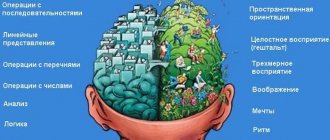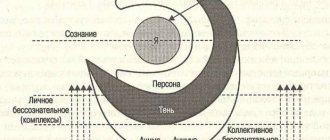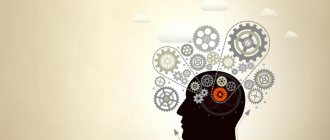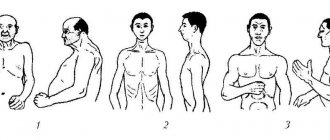We roughly know what kind of character we have. However, it often surprises even ourselves, so it is better to look deeper into the soul to know what to expect from yourself. Each of the 10 character tests presented is a unique opportunity to learn something new about yourself. And this will help you become better, change yourself.
Description of character by the manner of your speech
Learn something new about yourself, or confirm explicit information about your character traits. Take an interesting character test, which in the vast majority of cases is quite true. Based on the words you use most often, we'll tell you some facts about your personality traits.
We are sure that you really enjoyed taking such interesting tests. They allowed you to look at your character from different angles. Perhaps you will reflect on the results obtained, and now you know how to make yourself even better.
Comment
Answer 15 questions of the “What is my character” test and find out who you really are...
Do you get along with other people easily?
Are you able to provide free assistance?
Are your fears justified?
Can you laugh heartily?
Do you often have days when you are in a bad, depressed mood?
Are you able to provide moral support to a person?
How open are you when talking to a close friend?
When you're out with friends, are you the center of attention?
What books do you prefer to read?
Do you consider yourself touchy?
Do you consider yourself to be right, regardless of the situation?
How quiet a person are you?
Are you in high spirits most often?
What would you rather do on a rainy evening?
Do you have any fears?
test what is my character
Good guy! All actions are aimed at doing good to the people around us. Moreover, sometimes it comes to your own detriment. Of course, there are more than enough friends and acquaintances. But maybe it’s time to stop helping everyone around, and finally pay attention to yourself?!
Lirde! You know what you want in this life. Moreover, this knowledge appeared in early childhood. You can easily organize a large number of people, give everyone a task and make sure that things move towards a common goal. Looks like you have a great future ahead of you!
Crybaby! You are an overly sensitive person. You can be touched by a beautiful sunset, the sound of raindrops on the glass, and many things that others won’t even pay attention to. This is, of course, wonderful. But you also react to negativity in the same way. Let's say, as a result of criticism, you will be ready to destroy the fruit of your (possibly many years) labor in order to please others. Stop shifting responsibility to others! It's time to grow up after all!
Vicious! You are a selfish person. All your actions are subordinated to one single goal: the main thing is that I feel good. This is, to some extent, correct. But do not forget that you are not the only inhabitant of this planet. Others also have their own feelings.
How to describe your character on a resume
“Personal qualities” is one of the most difficult sections of a resume to fill out. It can be difficult to independently assess the strengths and weaknesses of your own character and at the same time please your employer. How to correctly describe your character in a resume ? There are no ideal people: every person’s character has both positive and negative sides. And the “personal qualities” section is a kind of honesty test
; If you only list your character strengths, the recruiter will likely have doubts about your sincerity.
In addition, some qualities cannot be clearly attributed to character strengths or weaknesses.
, a lot depends on the position. For example, communication skills are important for those specialists whose work is inextricably linked with communication with people. But, say, for an accountant or programmer, it is far from the first place.
What character strengths should you include on your resume?
All character traits indicated in a resume can be divided into four groups:
depending on what place they occupy in the system of relations: these are traits that show the attitude towards other people, towards oneself, towards work and towards things. Which character traits from each group should you include on your resume?
Attitude towards other people
Sociability (communication skills), sensitivity, responsiveness, politeness, friendliness, loyalty, reliability, non-conflict, organizational skills, ability to work in a team, sense of humor, leadership qualities.
Attitude towards yourself
Optimism, self-confidence, self-criticism, desire for self-improvement, cheerfulness, determination, determination, self-sufficiency, seriousness, honesty, modesty.
Attitude to work
Activity, ambition, analytical skills, attentiveness, flexibility, discipline, conscientiousness, initiative, creativity, resourcefulness, result orientation, organization, punctuality, enterprise, hard work, motivation, stress resistance, punctuality, responsibility, diligence.
Attitude to things
Accuracy, thrift, economy.
Of course, this division into groups is quite arbitrary, because some qualities can be attributed to more than one group. You should not indicate all the qualities listed in the example; write into your resume only those that you really have, choosing a couple of character traits from each group. The maximum number of positive traits is ten
.
You need to choose character traits for your resume taking into account the characteristics of the position.
for which you are applying. For example, you shouldn’t write about your sociability if your occupation involves painstaking and concentrated work: in this case, sociability is more likely to be a disadvantage than an advantage.
Try to avoid the “standard trinity” of qualities, which include responsibility, sociability and determination
. About 90% of applicants indicate them in their resumes, so these character traits will in no way make your resume stand out from others.
How to present your weaknesses in your resume
When compiling your own resume in any form, it is better to avoid describing your weaknesses altogether.
. But if a specific job search site or a specific company requires you to indicate them, you need to follow several rules.
Don't try to pass off your strengths as weaknesses.
, entering into this column workaholism, an exaggerated sense of responsibility, perfectionism, etc. This technique has long been outdated, and most recruiters immediately recognize it. You can’t put a dash either: as mentioned above, there are no ideal people.
The optimal solution would be to indicate 2-3 disadvantages
that are inherent to most people, and choose those that are not directly related to your activities and will not greatly affect the performance of your official duties.
Remember that the “personal qualities” column rather serves to test your honesty, self-criticism and adequacy, rather than to truly assess your character. Therefore , do not get carried away when filling out this section.
, better pay more attention to describing your professional experience, skills and abilities.
If the proposed resume template does not have a “personal qualities” section, you can safely omit their description. If a specific job search site or recruiter insists on filling it out, write just enough so as not to leave a dash, do not write a whole essay
on the topic of your character.
Character Formation
Before you begin to change your character, it is important to understand how it is formed.
- In fact, only 5% of character is determined at the genetic level. The remaining 95% arises under the influence of society and direct education. Agree: if you grew up in another country, family and with different traditions and ideas about the right life, you would be a person completely different from your current self.
- Parents or those replacing them have a direct influence on the development of a child’s character. This applies not only to adopting the behavior of adults, but also to remembering the attitudes they give. “Don’t interfere, keep quiet, you weren’t asked” and “Fit back, be first” are in stark contrast. And individuals brought up on such rules will be very different: one will grow up insecure, while the other will become a born leader.
- When a person’s social circle changes, a person’s character also tends to change, adapting or finding common points of intersection with the environment.
- There are also age differences. The younger a person is, the easier it is to retrain. With age, changing ingrained habits is much more difficult. In youth, interests differ from adolescence, and maturity and old age also contrast greatly.
It is worth considering that the innate ability to change is not the same. Just like inner strength. Therefore, for some it may be harder. And don't despair. And apply maximum patience.
Secondary traits
A secondary character trait does not constantly affect a person; for its manifestation, an external trigger, a situation, is needed. For example, you can react to a situation impulsively, that is, instantly make and implement a decision. They say about such people “first they do, then they think.” Also, the reaction can be judicious; such people are in no hurry to act, preferring to think through the consequences carefully. Both types of people can be in demand, it depends on the area of employment and the specifics of the business. During negotiations, approaches to such different opponents will also be different. For example, an impulsive person is easy to manipulate, while a reasonable person is easier to raise doubts about.
IMPORTANT! A secondary trait is not a random reaction and should not be confused with a superficial personality trait, which will be discussed later. The secondary trait is as constant as the primary one, but it manifests itself only under the pressure of certain circumstances.
Primary traits
A characteristic that is always characteristic of a person is called a primary character trait. Such a trait does not have to manifest itself in any case, however, it is there, and it is well expressed. For example, a sociable person may not show his sociability in some cases, this does not negate his ability to find a common language with people and become the center of attention. Why is it important? An employee who has such a primary trait as conscientiousness at work may be slack and negligent, but an employee who cannot boast of such a trait will be more likely to slack. Therefore, when you predict a person's long-term behavior, primary traits are the basis of the prediction. If they are not revealed, then there are obstacles that can be found and eliminated.
- goodwill – conflict;
- diligence - a tendency to idleness;
- initiative - inertia;
- communication skills - isolation.











